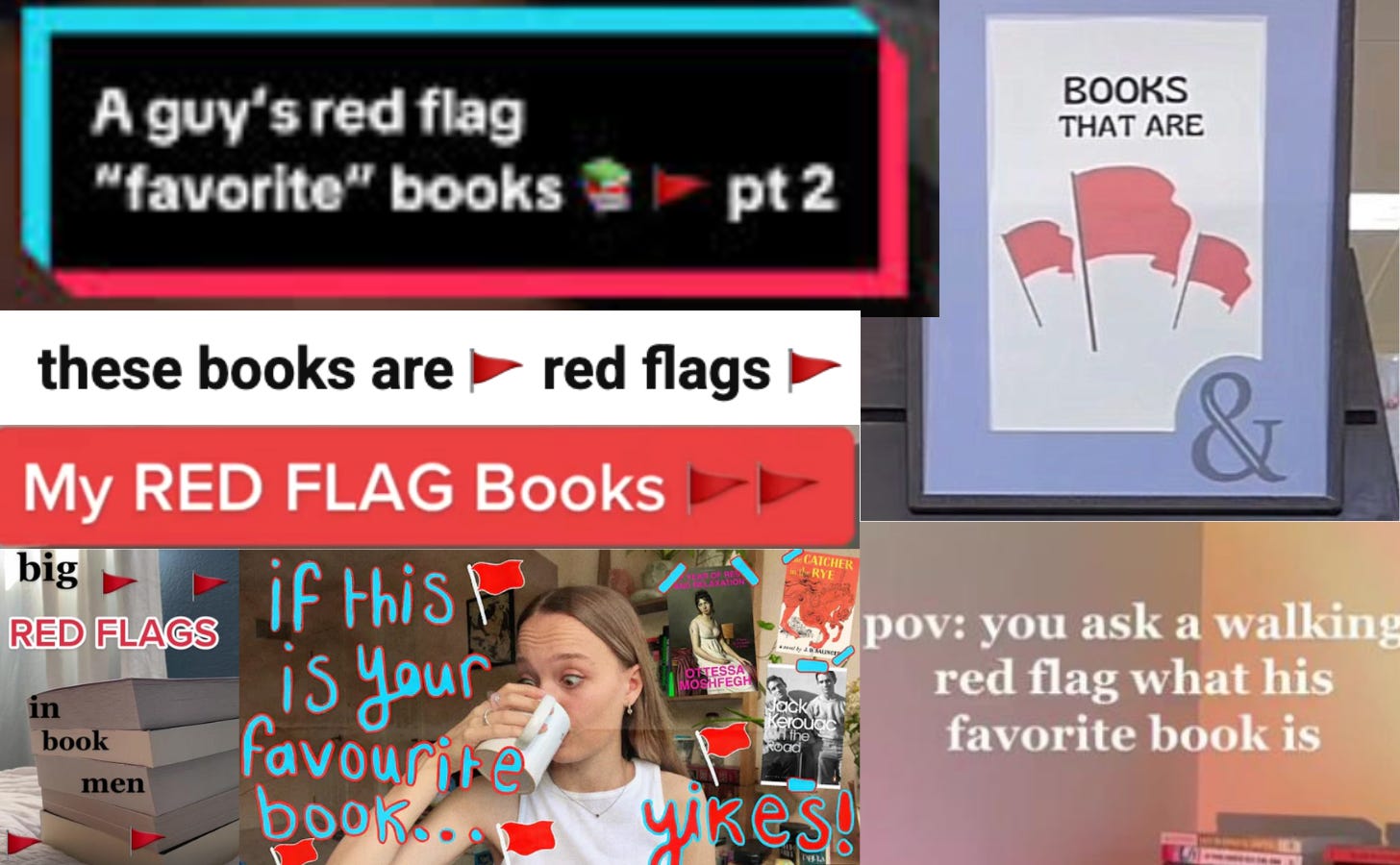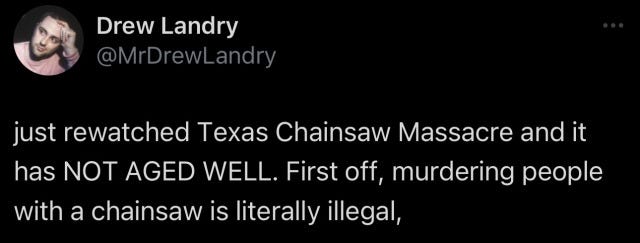Coverage does not equal endorsement
Being afraid to discuss the bad stuff probably isn't the hallmark of a healthy, art-forward society.
You’re reading Creativity Under Capitalism, a free biweekly newsletter about reclaiming and sustaining creative joy under tricky socioeconomic circumstances. I’m Adrianna, a journalist and creative writer based in Phoenix, AZ. If you’re just getting settled in, check out previous issues of Creativity Under Capitalism—and if you like what you see, consider leaving a comment or buying me a coffee to make my day!
The other day, as we wrote side by side at our favorite bookstore, my friend turned to me and asked: “Do you think it’s okay that my short story uses the word ‘bitch?’”
The character who wielded the term, she said, wasn’t a super great guy—in fact, the whole reason he called someone a bitch was to reveal how coarse and inconsiderate he was. Still, my friend was worried the word would turn off readers, especially when she was submitting the story to workshop and education opportunities. She’d been browsing beta reader profiles recently and had come across a reader who said they refused to read anything “unkind.”
𖦹
It was summer 2023, and I was browsing my favorite Barnes & Noble location near my dad’s house in California. I strolled through the fiction section and found myself face to face with a “red flag favorites” endcap display. Little acrylic shelves held copies of The Catcher In the Rye, Atlas Shrugged, Fight Club, American Psycho, The Stranger. I griped to a friend about how absurd this was, only to be told that this was a phenomenon that had been plaguing online reading communities for months.
𖦹
During Arizona’s measly COVID-19 lockdown, I finally finished the first draft of a novel I’d been writing for two and a half years. After a couple halfhearted rounds of edits, I paid a sensitivity reader to flag any potential harms my prose could have accidentally caused, if published. She called me up to let me know that I couldn’t have one of my characters call the other “crazy.” She didn’t want me to get cancelled on Twitter.
𖦹
Last fall, sifting through the stacks at a used book store, I stumbled upon a tattered copy of Lolita with solely the title on the cover. Finally, I thought, a copy without a sexual cover. I bought it and began reading it shortly thereafter, but, afraid people might think I was a total pervert for reading it at all, I only ever read it at home.
I’ve been stewing on these snippets for a while now. The surface simmers every time I see a social media post like We could have done without a whole musical full of excuses for Elphaba’s behavior or If he says his favorite author is Jack Kerouac, run! I’ve wanted to write about this bizarre storm of self-censorship and shame-ridden art consumption, but have hesitated to do so, probably because I’m not sure how we got here. Is it because the United States, where I live, is currently weighing down the conservative end of its sociopolitical see-saw? Is it because fascism is seeing a global resurgence? Is it because #BookTok has become so popular that so-called “content creators” are desperate to create attention-driving controversy? Maybe it’s all three things; maybe it’s none of them.
I haven’t read 1984 for a while (is that another red flag book?) and I know I’ll probably sound like this meme when I say this, but it often feels like we’re all sort of assuming that at any time, someone overseeing our reading habits, purchases, conversations, et cetera might point at us and laugh at our choices. Worse, they might persecute us online; they might “cancel us on Twitter,” as my sensitivity reader put it. And, sure, maybe cancel culture has played a role in this. Maybe spending a few too many years on Tumblr, where everyone’s a critic, has made some of us afraid to say we consume and sometimes even enjoy media featuring problematic themes and taboo topics.
But that’s exactly what troubles me so much. A novel that investigates pedophilia isn’t the author’s endorsement of pedophilia. A story in which a character calls a woman a bitch isn’t the author’s endorsement of misogyny. These are simply creative works that acknowledge real forms of harm—big and small, but usually big—and explore how those harms can play out.
There’s this concept in journalism that’s often summed up as “coverage does not equal endorsement.” It means that talking about a particular person, thing, or topic doesn’t mean the journalist or outlet “supports” that subject; it simply means the journalist is conveying information about the subject to the public, where people can process and react to it as they wish.
I’m not suggesting journalists and artists play identical roles, but I think the concept of discussion not equaling endorsement can extend to a lot of things beyond the news. A screenwriter whose work revolves around murder doesn’t “support murder” any more than the work made by a reporter on the crime beat; both of them are just shining a big ol’ flashlight on the subject, allowing their audiences to examine it from different angles. Further, a person who watches Texas Chainsaw Massacre is also no more of a murder endorser than someone who reads about a tragic incident on their favorite local news site.
You should be able to talk about “ugly” things with your family members, friends, and partner from an exploratory, information-seeking perspective. You should be able to make art that touches on unsavory and complicated things without your audience assuming you support those things, and you should be able to experience art that examines those topics without someone calling you a perv or an abuser or a “walking red flag” for doing so.
In fact, I’d argue that art without any semblance of ugliness risks feeling a bit bland. I’m not saying that a landscape painting or a fluffy love poem can’t be interesting, but I do think it becomes more memorable when the sun is setting over a field of overworked and underpaid migrant workers or when someone is falling back in love with life after great loss. There’s a longstanding (and frankly overwrought) online argument over whether a story without conflict is no story at all, and I’m one of those annoying people who insist that that’s true, that virtually no one wants to hear about your trip to the grocery store unless you ran out of gas on the way there.
Art has always been how humans explore difficult, enraging, and heartbreaking topics. It is not the artist’s responsibility to hold their audience’s hand, ensuring that by the end, they know murder is wrong. Bret Easton Ellis is pretty clear about Patrick Bateman being an unhinged, satirical caricature of the 1980s wealthy American businessman, but it would have been okay for him to write that character even if he’d been less clear. Humbert Humbert calls himself a criminal and otherwise reveals himself (in the first person!) to be a sick and selfish person multiple times throughout Lolita, but even if he hadn’t, it would have been okay to let readers come to that conclusion on their own.
Art is allowed to present one chunk of information, one take, one pathway, and then leave. Someone will always be upset about whatever path you didn’t provide, so you’d might as well choose the one that feels truest to you. Your art doesn’t need to serve as a guide for a proper life, because that’s not what it’s for.
What’s been inspiring me lately:
✰ Djo’s new album, The Crux. Joe Keery’s music is so freaking cool and creative, and it’s refreshing to experience an album in which each song feels wholly distinct from the next.
✰ Dead In Long Beach, California by Venita Blackburn. I found this literary novel tricky to read at first, but once I got into the rhythm of things, I found it really creative and insightful. I love Blackburn’s observations of tiny mannerisms that go largely unnoticed but ring true, and the story is an interesting exploration of what bizarre things one might do after a lifetime of grief.
✰ On Earth as It Is on Television by Emily Jane. This was such a cute, fun, and heartwarming read! Definitely recommend if you’re looking for a version of the “aliens visit Earth” story that doesn’t really lean sci-fi and incorporates a lot of humor.
✰ A really lovely visit to Slide Rock State Park in Sedona, AZ. It was my first time at Slide Rock—a natural water slide in Oak Creek!—and I was charmed by the summer camp vibes. Kids played in the water, couples shared sandwiches, girls stretched out on towels with paperbacks, my partner and I froze our butts off on the slide. Sometimes you really need a brand-new positive experience to grab your brain and shake it a little! (I have a fun story about Slide Rock coming this Sunday via SFGATE, if you’re interested in reading more about the park!)








YES YES YES. I feel like in the days of cancel culture, people are feeling as though all media consumption, including books need to be sanitized and perfect in order to be appropriate for readers. I often see this portrayed in the music world, like when Olivia Rodrigo started selling shot glasses on her website after her 21st birthday and people got up in arms about “her influence on a young audience”. Or if a person talks about a romance book they’re reading online I usually see a reply of “what if your kid found that!” (Even if the person had no kids, it’s like everyone has an Imaginary Potential Child who can see what they’re reading. It’s like the new “God is watching”).
As someone who has always loved the horror genre, and who overall enjoys imperfect stories with imperfect characters (like, hello the hero’s journey???) I love your take on this. We can enjoy dark content or troubling content in books without thinking “ya know what I actually think ac murdering is a great idea”. For me personally, horror media actually helped a lot with my anxiety in high school. There was something comforting about knowing that worse things could happen to me than failing a biology test. 😂
I really appreciate the points you made here. Folks don't realize it, but this mode of thinking is a form of authoritarianism in and of itself. People who think they're progressive are actually the thought police. I don't understand what these people want us to do--should we throw out all of classic literature and make Colleen Hoover required reading? lol PLEEEASE
So many of my favorite books are full of things that make me uncomfortable, but that makes these books valuable because they reflect real life!
I also feel annoyed that people don't seem to want to read unlikeable characters. The world is full of unlikeable characters, and its worth our time to try and understand them!